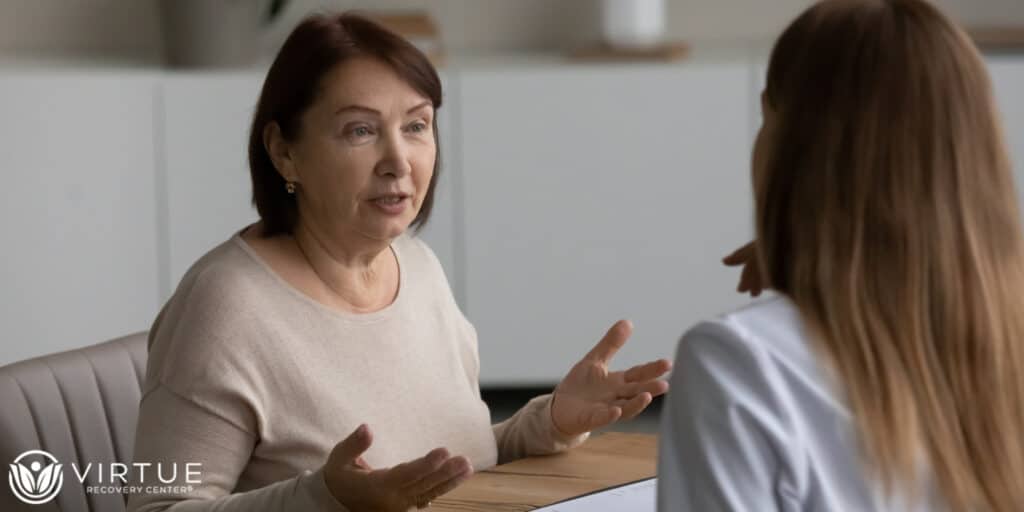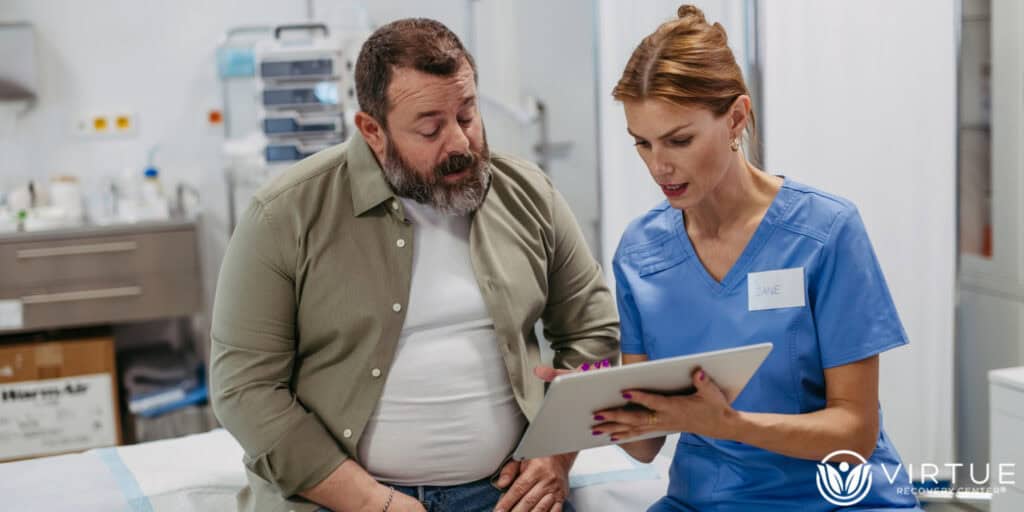
Table of Contents
Key Takeaways
- Drug detox is riskier for older people, both physically and mentally.
- Detox protocols are affected by changes in metabolism and organ function that come with age.
- Because of having more than one mental health disorder, dual diagnosis treatment is often needed.
- Seniors may also develop or get worse behavioral addictions during detox.
- Comprehensive care makes people safer, more comfortable, and more likely to recover in the long term.
Introduction
Detoxing from drugs is an essential first step in getting over an addiction, but for older adults, this process can be more complicated from a medical point of view. Withdrawal affects older bodies in different ways, and having other health problems at the same time can make treatment harder. Detoxing later in life needs medical supervision, personalized plans, and emotional support, whether you’ve been addicted to opioids for a long time or have just started using prescription drugs. Because more older Americans are using drugs, doctors are rethinking how they detox people. Recent data shows that a lot more adults over 65 are looking for help with substance abuse. With this rise, there is an urgent need for drug detox care that is tailored to each age group and takes into account physical fragility, mental health needs, and social factors like grief or isolation. This blog talks about the problems that older people face when they try to get off drugs, the need for dual diagnosis treatment, and how doctors can help seniors get through withdrawal safely.Why Is It Harder for Older People to Get Off Drugs?
Almost every system in the body is affected by aging, which changes how drugs are broken down. As we age, the liver and kidneys, which are responsible for breaking down and eliminating substances, don’t work as well. Because of this, withdrawal symptoms can get worse and last longer. Even small amounts of detox drugs can cause side effects that weren’t expected. High blood pressure, diabetes, and heart disease are all common health problems in older people that make withdrawal even harder. There are also worries about drugs interacting with other medicines that are prescribed. For instance, benzodiazepines used to help with alcohol withdrawal may not work well with medications for depression or dementia. According to the U.S. National Library of Medicine, these co-occurring conditions mean detox should always take place in a medically supervised environment. This ensures personalized medication management, round-the-clock monitoring, and rapid response to emergencies.What Part Does Dual Diagnosis Treatment Play in Detox for Seniors?
 When someone has both a substance use disorder and a mental health condition, dual diagnosis treatment means that both conditions are treated at the same time. A lot of older people have both a mental illness and a substance use disorder. People who are addicted to drugs or alcohol can also have depression, anxiety, grief, PTSD, or even early dementia. These conditions are often not diagnosed or are misdiagnosed.
Years of drug use may have hidden these problems, or they may have been wrongly blamed on “normal aging.” Detox alone is unlikely to lead to long-term recovery if the underlying mental health problem isn’t found and treated. NIDA emphasizes the need for integrated approaches tailored to older adults, including:
When someone has both a substance use disorder and a mental health condition, dual diagnosis treatment means that both conditions are treated at the same time. A lot of older people have both a mental illness and a substance use disorder. People who are addicted to drugs or alcohol can also have depression, anxiety, grief, PTSD, or even early dementia. These conditions are often not diagnosed or are misdiagnosed.
Years of drug use may have hidden these problems, or they may have been wrongly blamed on “normal aging.” Detox alone is unlikely to lead to long-term recovery if the underlying mental health problem isn’t found and treated. NIDA emphasizes the need for integrated approaches tailored to older adults, including:
- Psychiatric evaluation to look at mood, thinking, and behavior
- Managing medications based on age and health issues
- Psychotherapy, such as reminiscence therapy or grief counseling
- Getting family involved to help fix relationships and support systems
Can Behavioral Addictions Make Detox Harder for Older People?
Yes. Drug detox is mostly about getting rid of drugs, but behavioral addictions like compulsive gambling, internet use, or hoarding can get worse during the process. These actions may have been ways to deal with or avoid deeper emotional pain. Behavioral addictions in older people are often caused by being alone, losing their sense of purpose after retirement, or losing loved ones. When the chemical buffer of drugs is taken away, unresolved mental health problems can come to the surface, making compulsive behaviors worse. That’s why complete detox programs should look for behavioral addictions and offer early help like therapy and support groups. If you don’t deal with these problems, you are more likely to relapse or start doing other harmful things.What Are the Most Important Medical Things to Do During Detox for Older People?
 For a safe and effective detox for seniors, several medical issues need to be taken into account:
For a safe and effective detox for seniors, several medical issues need to be taken into account:
- Stabilization: The first thing to do is take care of vital signs, hydration, and nutrition. Older adults with substance use disorders often don’t get enough food.
- Changes to medications: Drugs used to help with withdrawal, like methadone and buprenorphine, need to be given in smaller doses and watched closely because they take longer to break down.
- Preventing Falls: Symptoms of withdrawal, such as dizziness, confusion, or tremors, can increase your risk of falling. It is essential to have safe places to live and help with moving around.
- Cognitive Support: You may have delirium or temporary confusion while detoxing. It is essential to tell the difference between these symptoms and dementia or other mental disorders.
- Comprehensive Monitoring: Ongoing medical supervision is essential for spotting and dealing with problems like seizures, heart problems, or severe agitation.
What Drug Is the Hardest to Quit in the United States?
Many experts say that opioids are the hardest drug to quit in the US when people ask. These drugs, especially fentanyl and heroin make you very dependent on them and make you feel terrible when you stop taking them. But quitting alcohol and benzodiazepines (like Xanax and Valium), which are both commonly used by older adults, can be even more dangerous because of the risk of life-threatening withdrawal. Older people may also have trouble with prescription drug addiction, sometimes without even knowing it. Taking painkillers, sleep aids, or anxiety medications for a long time can make you very dependent on them. In these situations, detox must be done with medical supervision to avoid seizures, delirium, or heart failure. The “hardest drug” for each person depends on their medical history, how long they’ve been using it, and any other mental health problems they may have. That’s why it’s so important for older adults to have detox plans that are made just for them.How Can Family Members Help a Loved One Who Is Going Through Detox?
Family involvement is significant for a senior’s detox and recovery. Addiction can make older people feel ashamed or stigmatized, which can make them secretive and alone. Support from kind loved ones can help individuals be open and fully participate in treatment.How families can help:
- Encourage medical detox instead of trying to quit at home.
- Go to therapy sessions or family counseling.
- Learn more about dual diagnosis and the challenges associated with aging.
- Give rides to follow-up appointments or therapy.
- Give emotional support without judging or putting pressure on them.
Könnte eine sichere Entgiftung bei älteren Erwachsenen mit Lebererkrankungen spezielle medizinische Überlegungen mit sich bringen, die auch bei der Drogenentgiftung zu beachten sind?
Eine sichere Entgiftung bei älteren Erwachsenen mit Lebererkrankungen erfordert besondere medizinische Überlegungen. Die Leber spielt eine zentrale Rolle im Entgiftungsprozess, und deren eingeschränkte Funktion kann die Effektivität und Sicherheit der Behandlung beeinflussen. Daher ist eine sorgfältige Planung der alkoholentgiftung für senioren mit lebererkrankungen entscheidend, um Komplikationen zu vermeiden.
Conclusion
Detoxing from drugs is never easy, but it’s even more complex and riskier for older adults, who need special care. During the withdrawal process, you need to think about your physical weaknesses, any mental health issues you may have at the same time, and even any behavioral addictions you may have. Trying to detox at home or in a generic facility might miss these details and put the person’s health at risk. Families and healthcare providers can help make sure that older adults have a safer and more dignified path to recovery by choosing a detox program that is right for them. Dual diagnosis treatment, behavioral health support, and regular medical checkups all help people get better and have a better quality of life. We know that detoxing can be hard on both the body and the mind for older people at Virtue Recovery Center. Our team of experts offers personalized, medically supervised detox and dual diagnosis care that puts safety, comfort, and long-term healing first. Don’t wait to help your loved one if they need it. Call us at 866-461-3339 today to talk to a caring professional who can help you figure out what to do next.Gibt es spezielle medizinische Überlegungen für ältere Erwachsene, die von MDMA abhängig sind, und wie unterscheiden sich diese von den für andere Drogen geltenden Überlegungen?
Ältere Erwachsene, die von MDMA abhängig sind, benötigen besondere medizinische Überlegungen, da sie häufig an bestehenden gesundheitlichen Problemen leiden. Strategien zur bewältigung von mdma und angst sollten individuell angepasst werden, um Wechselwirkungen mit anderen Medikamenten und altersbedingte Veränderungen im Stoffwechsel zu berücksichtigen. Dies unterscheidet sich von der Behandlung jüngerer Drogenabhängiger.
FAQs
Is detox safe for older people who have more than one health problem?
Yes, but only in a place where a doctor can watch over it. Seniors with long-term illnesses need close monitoring, changes to their medications, and help all the time.What does “dual diagnosis” mean, and why is it important for older people?
Dual diagnosis means treating both a mental health problem and an addiction at the same time. Issues like depression or anxiety in older people often go untreated, which can make withdrawal worse.How long does it take for older people to detox?
Detox usually lasts between 5 and 10 days, but it can take longer depending on the drug used, the person’s health, and any mental health issues they may have at the same time.What’s next after detox?
After detox, you need ongoing care like therapy, counseling, and maybe even inpatient or outpatient rehab to help you stay sober and avoid relapsing.Are people with behavioral addictions helped during detox?
Yes, if found early. Programs that test for behavioral addictions like gambling or hoarding can help people even while they are going through detox.Resources:
- National Institute on Drug Abuse. “Older Adults.” National Institute on Drug Abuse, U.S. Department of Health and Human Services, NIDA, https://nida.nih.gov/research-topics/older-adults.
- National Institute on Drug Abuse. “Substance Use in Older Adults DrugFacts.” National Institute on Drug Abuse, U.S. Department of Health and Human Services, NIDA DrugFacts, https://nida.nih.gov/publications/drugfacts/substance-use-in-older-adults-drugfacts.
- U.S. National Library of Medicine. “Prevalence and Treatment of Substance Misuse in Older Adults: Beyond Early Adulthood.” PMC, U.S. National Institutes of Health, https://pmc.ncbi.nlm.nih.gov/articles/PMC11264375/.
Are You Covered For Treatment?
At Virtue Recovery Center, we understand the importance of accessible care. That’s why we’re in-network with numerous private insurance companies, ensuring that your journey to recovery is supported from the start. Let us help you quickly and easily verify your insurance coverage. Begin your path to healing today.
- About the Author
- Latest Posts
Gigi Price( Clinical Director )
Gigi Price holds licenses as a Master Social Worker and Clinical Drug Counselor. She completed her master’s degree in Social Work at Texas State University. Over the last decade, Gigi has been dedicated to utilizing evidence-based practices to enhance patient care and treatment planning, resulting in positive, long-term outcomes for patients and their families. Her passion lies in creating a treatment environment where professionals collaborate to bring about positive change and provide a safe, trustworthy therapeutic experience. Patients can be confident in receiving top-quality care under her leadership.
In her role as the Clinical Director of Virtue Recovery Houston, Gigi conducted research to identify the most effective approaches for treating patients with acute mental health diagnoses, PTSD, and Substance Use Disorder. She then assembled a team of skilled clinicians who could offer various therapeutic modalities, such as Cognitive Behavioral Therapy (CBT), Dialectical Behavioral Therapy (DBT), Acceptance and Commitment Therapy (ACT), Somatic Exposure, Eye Movement Desensitization and Reprocessing (EMDR), and Cognitive Processing Therapy (CPT). Gigi takes pride in overseeing the development and implementation of Virtue Houston’s Treatment Program, which includes two specialized therapeutic curricula tailored to the unique needs of individuals struggling with mental health issues, addiction, and PTSD.
How Cognitive Behavioral Therapy Supports Lasting Sobriety After Cocaine Addiction …
How an Eating Disorder Program Helps Manage Binge-Eating Episodes Key …
Key Takeaways Regular exercise reduces cravings and withdrawal symptoms. Physical …
Key Takeaways Veterans Day began as Armistice Day in 1918 …
Key Takeaways Proper nutrition plays a vital role in addiction …
Key Takeaways Long-term sobriety is achievable with evidence-based addiction treatment …


























